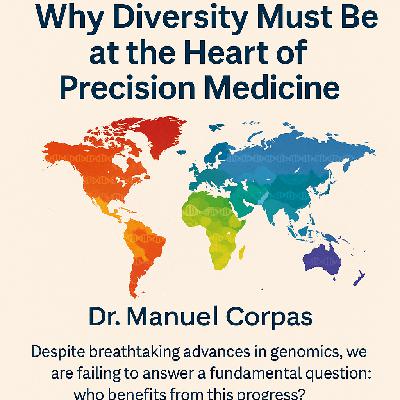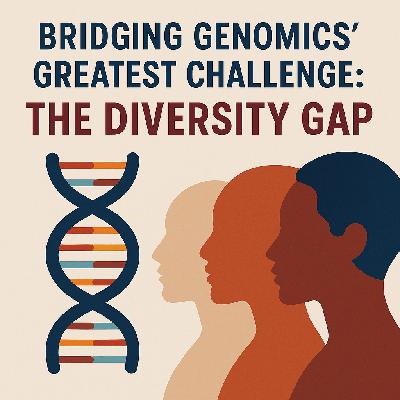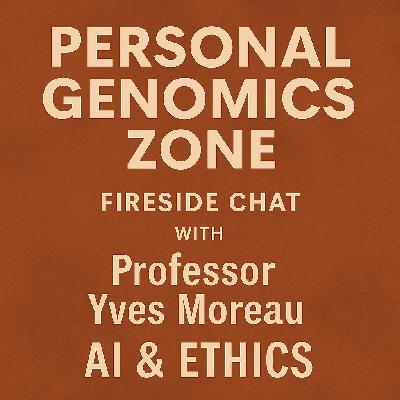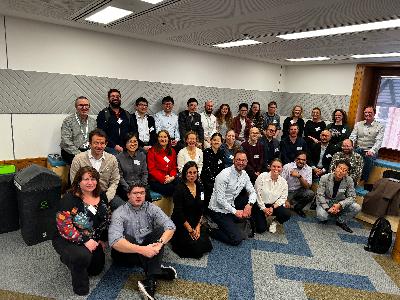Health Data Equity in Latin America in the Age of AI and Genomics
Description
A recap of my presentation to Britcham Brazil, 7 October 2025
<figure class="wp-block-embed is-type-video is-provider-youtube wp-block-embed-youtube wp-embed-aspect-16-9 wp-has-aspect-ratio">
<figure class="wp-block-audio"></figure>
This morning I had the privilege of presenting to a distinguished audience at the British Chamber of Commerce and Industry in Brazil (Britcham), as part of a webinar titled “Health Data Equity in Latin America in the Age of AI and Genomics.” I was joined by Mr. Adam Patterson (Deputy Director and Honorary Consul in Curitiba), Mr. Luciano Moraes (President of the Technology and Innovation Committee), and Mr. Luiz Felipe Di Sessa (Vice-President of the same committee), who moderated and contextualised the discussion with clarity and insight.
My presentation focused on a simple but powerful idea: genomics and AI can transform healthcare but only if the data that powers them represents us all.
Setting the Scene: Why Equity Matters
I began by presenting the current landscape: despite Latin America accounting for over 650 million people, it contributes less than 2% of global genomic data. This underrepresentation creates a knock-on effect. AI models trained on Eurocentric datasets inevitably perform worse for populations like Brazil’s, leading to misdiagnoses, overlooked risks, and missed opportunities for precision treatments.
To ground this problem, I shared data from multiple studies (Popejoy & Fullerton 2016; Fatumo et al. 2023; Skantharajah et al. 2023) showing how clinical trials, genomic repositories, and pharmacogenomic datasets disproportionately reflect individuals of European descent: mostly men, mostly from a handful of high-income countries .
Why This Matters for Brazil
Brazil’s population is one of the most genetically diverse in the world, with layered ancestries tracing Indigenous, African, and European roots. I presented evidence of Brazil’s complex Native American admixture, which occurred long before European contact, highlighting the scientific and clinical importance of this diversity.
Yet this diversity is largely invisible in current AI and genomic infrastructures. We risk creating diagnostic tools and therapeutic models that simply don’t work for large segments of Brazil’s population, especially its Indigenous and Afro-descendant communities.
The Role of Biobanks
I underlined how biobanks can be powerful enablers of equity, offering researchers large, structured datasets that include genetic, environmental, and social variables. But to serve as global resources, these biobanks must be inclusive from the start. If not, they replicate existing biases at scale .
The AI Equation: Bias In, Bias Out
AI learns from data, and when that data is skewed, so are the outputs. I walked the audience through examples of how AI systems can misclassify risk in underrepresented populations, or entirely miss pathogenic variants because they’re rare in European datasets but common in Latin American ones .
But I also highlighted the positive potential: with the right guardrails, AI can help correct bias. Tools like:
- Representation dashboards
- Bias audits
- Synthetic augmentation using generative AI
can be deployed to make models more fair and more robust.
Brazil’s Unique Opportunity
I closed by emphasising that Brazil is uniquely positioned to lead in equity-aware AI and genomics. Its national health system (SUS), combined with its genomic richness, creates the conditions for building world-leading, inclusive infrastructure. If Brazil chooses to invest in its own biobanks, equity dashboards, and genomic AI models, it could emerge not just as a regional leader but as a global standard-bearer for responsible innovation.
Closing Thoughts
My message was clear: inclusion drives accuracy. The more representative our data, the more effective our AI. Latin America’s diversity is not a problem to be solved, but a resource to be celebrated. It holds the key to scientific discoveries with global impact.
























